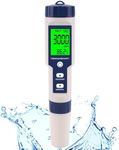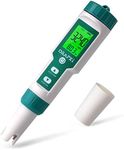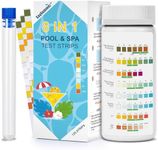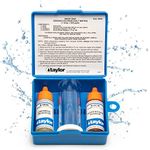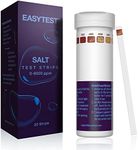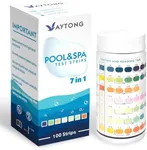Buying Guide for the Best Salt Water Pool Testers
Choosing the right salt-water pool tester is essential for maintaining the health and safety of your pool. A good tester will help you monitor the chemical balance of your pool water, ensuring it is safe for swimming and preventing damage to your pool equipment. When selecting a salt-water pool tester, consider the following key specifications to find the best fit for your needs.Type of TesterSalt-water pool testers come in various types, including test strips, liquid test kits, and digital testers. Test strips are easy to use and provide quick results, making them suitable for casual pool owners. Liquid test kits offer more precise measurements and are ideal for those who want detailed information about their pool's chemistry. Digital testers provide the most accurate readings and are perfect for tech-savvy users who prefer convenience and precision. Choose the type that aligns with your comfort level and the level of detail you need.
Parameters TestedDifferent testers measure different parameters, such as chlorine levels, pH, alkalinity, calcium hardness, and cyanuric acid. It's important to choose a tester that measures all the parameters relevant to your pool's maintenance. For a salt-water pool, ensure the tester can measure salt levels accurately. If you are a beginner, a tester that covers the basic parameters like chlorine and pH might be sufficient. More experienced users might prefer a comprehensive tester that includes additional parameters for more detailed analysis.
AccuracyAccuracy is crucial for maintaining the correct chemical balance in your pool. Test strips are generally less accurate than liquid test kits and digital testers. Liquid test kits offer good accuracy if used correctly, while digital testers provide the highest accuracy. If you need precise measurements to maintain your pool, opt for a digital tester. For general maintenance, a liquid test kit or high-quality test strips may suffice.
Ease of UseEase of use is an important factor, especially if you are new to pool maintenance. Test strips are the easiest to use, requiring you to dip the strip in the water and compare the colors to a chart. Liquid test kits involve more steps, such as adding reagents and comparing colors, which might be more challenging for beginners. Digital testers are user-friendly and provide instant readings, making them ideal for those who prefer a hassle-free experience. Consider your comfort level with the testing process when making your choice.
DurabilityDurability refers to how long the tester will last and how well it can withstand regular use. Test strips are disposable and need to be replaced frequently. Liquid test kits can last longer if stored properly, but the reagents may expire over time. Digital testers are generally durable and can last for years with proper care. If you want a long-lasting solution, a digital tester might be the best option. For occasional use, test strips or liquid test kits can be more cost-effective.
Calibration and MaintenanceSome testers, especially digital ones, require regular calibration to maintain accuracy. This involves using calibration solutions to adjust the tester's readings. Liquid test kits and test strips typically do not require calibration but may need proper storage to maintain their effectiveness. If you prefer a low-maintenance option, test strips or liquid test kits might be more suitable. If you are comfortable with occasional calibration, a digital tester can provide more accurate and reliable results.
